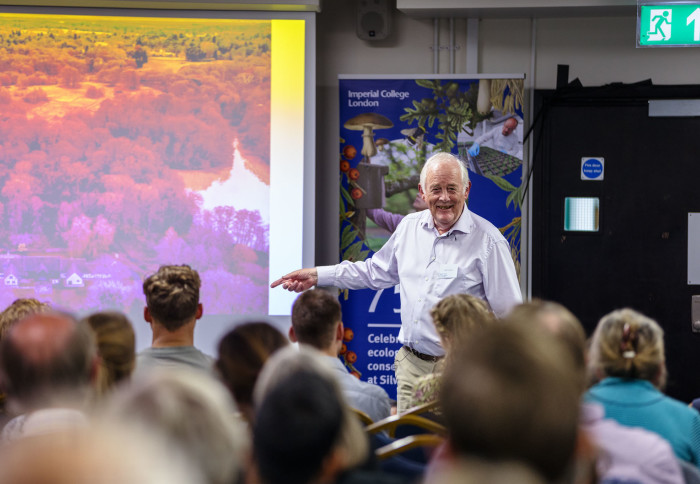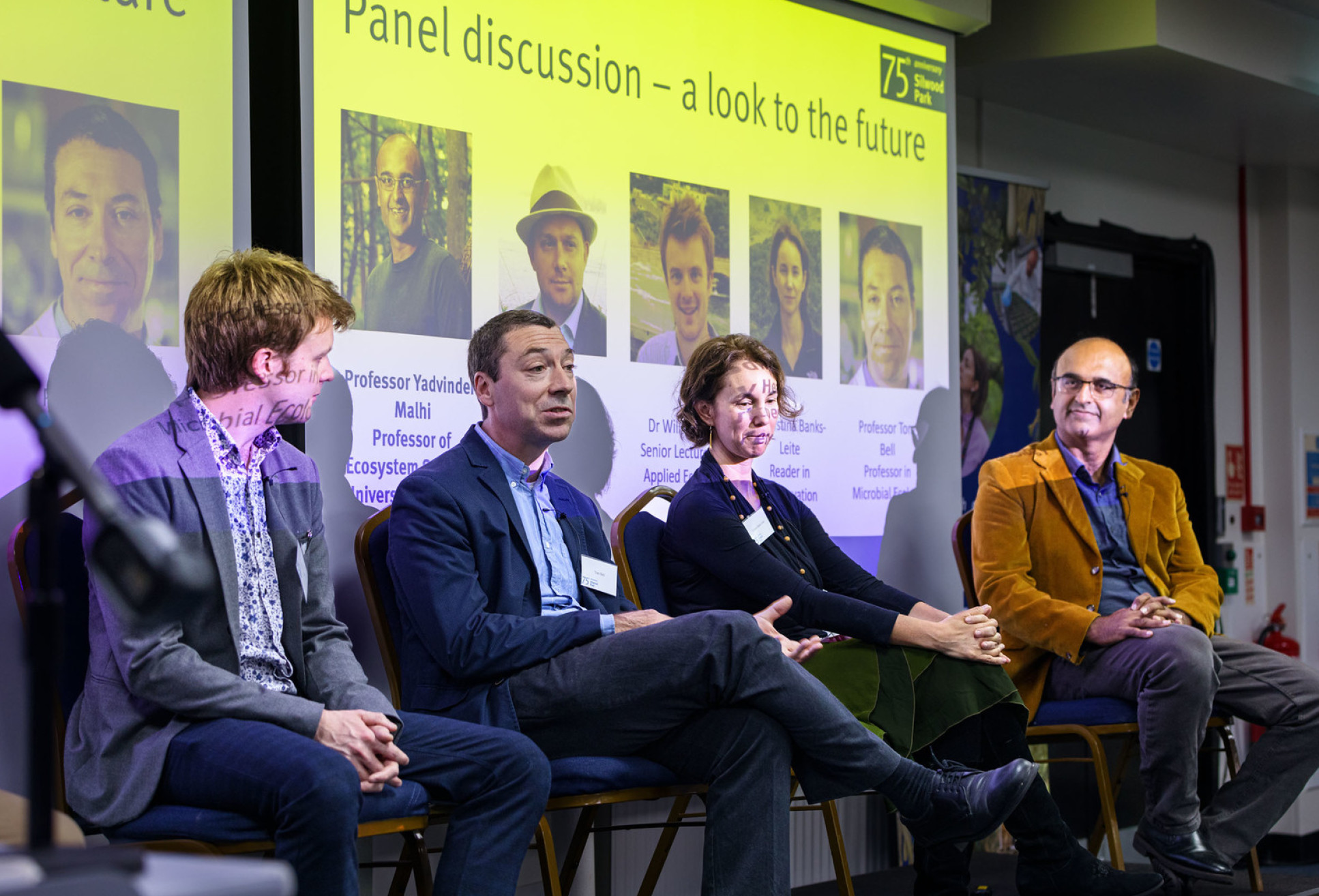Silwood science shines at 75th anniversary flagship celebration
by Emily Govan

Professor Mick Crawley
Imperial’s Silwood Park celebrated its 75th anniversary with a flagship event which brought together Silwoodians past and present.
The special afternoon of talks explored the rich and diverse story of Silwood at Imperial and showcased the wide variety of activities taking place today, as well as looking ahead at what the future might hold.
Nearly 200 alumni, staff and PhD students gathered at the grounds of Silwood Park to enjoy the opportunity to catch up with old friends and colleagues at the Georgina Mace Centre for the Living Planet.

The event began with a warm welcome and introductions from the host and organiser of the event, evolutionary developmental biologist Professor Armand Leroi.
This was followed by a lively trip down memory lane from Emeritus Professor of Plant Ecology Mick Crawley, who provided a personal history of Silwood and its people from the first days of entomology to the ecology and evolution that takes place now. From James Munro to Southwood and May via the various habitats of Silwood and its one-time nuclear reactor, this was an enthralling and entertaining talk that brought back vivid memories for many and piqued the interest of others.
Young Researcher Talks - Silwood PhDs/Postdocs
The audience were then wowed by a series of four lightning talks, given by some of the best and brightest current researchers of Silwood.
COVID-19 Seasonality – Ecology meets Epidemiology at Silwood Park - Dr Tom Smith, Research Associate.
Dr Tom Smith reported on his work around COVID-19 spread with a cross-disciplinary COVID seasonality team, and how although transmission of the virus varies seasonally, warmer conditions are not enough to prevent transmission.
"One of the great things about Silwood is that, although we are a campus mainly centred upon ecology and evolution, there is an amazing amount of diversity in different peoples' research interests extending far beyond that remit." Dr Tom Smith
Dr Smith said: “One of the great things about Silwood is that, although we are a campus mainly centred upon ecology and evolution, there is an amazing amount of diversity in different peoples' research interests extending far beyond that remit.
I've had the pleasure of working with lots of people, which has given me the opportunity to learn so many new things that I would otherwise have never experienced, and has made me a much more well-rounded scientist in the process!”
Discovering new genetic technologies for pest control - Dr Katie Willis, Research Associate.
 Dr Katie Willis, working as part of the Target Malaria consortium, reported on her work seeking to prevent the spread of malaria and prevent its social and economic costs by developing genetically modified mosquitoes. Gene drive technology is being tested in labs, where it helps spread a modification affecting the mosquitoes’ reproduction. The eventual aim would be to reduce local populations of mosquitoes and thus decrease malaria transmission.
Dr Katie Willis, working as part of the Target Malaria consortium, reported on her work seeking to prevent the spread of malaria and prevent its social and economic costs by developing genetically modified mosquitoes. Gene drive technology is being tested in labs, where it helps spread a modification affecting the mosquitoes’ reproduction. The eventual aim would be to reduce local populations of mosquitoes and thus decrease malaria transmission.
Same-sex sociosexual behaviour is widespread and heritable in male rhesus macaques - Jackson Clive, Research Postgraduate.

Same-sex sociosexual behaviour has been observed in over 500 species throughout the animal kingdom. Jackson Clive’s research looked at how this behaviour is heritable and how it can therefore evolve, with no sign of reproductive cost. In fact this behaviour can help strengthen pair bonds in conflicts against other individuals, through the use of conflict ‘coalitions’.
The songs of the Spider Monkey - Dr Jenna Lawson, Research Associate.
As more land is altered by human activity and more species face extinction, it is essential to understand how to conserve threatened species across human-modified landscapes. Dr Jenna Lawson told the audience about her work using passive acoustic monitoring to better understand the songs of the spider monkey and help effectively protect and manage vulnerable species.
"The staff and student community here at Silwood make it such a great place to work, as well as the opportunity to work alongside amazing researchers at the top of their respective fields." Dr Jenna Lawson
Dr Lawson said: “During my PhD I used passive acoustic monitoring to understand tipping points of human disturbance for the endangered Geoffroy's spider monkey in Costa Rica and to understand the effectiveness of current management actions for this species. I am building on this work during my post-doctoral studies under a collaboration with the aeronautics department in South Kensington, where we are using robotics to facilitate acoustic sensing in complex ecosystems. The staff and student community here at Silwood make it such a great place to work, as well as the opportunity to work alongside amazing researchers at the top of their respective fields”.
The future of ecological research in the UK
Professor Yadvinder Malhi, Professor of Ecosystem Science at the University of Oxford and President of the British Ecological Society, gave a talk about the future of ecological research in the UK. This was followed by a lively panel discussion chaired by Dr Malhi with Silwood academics Professor Woodward, Dr Will Pearse, Dr Cristina Banks-Leite and Professor Tom Bell.
"Silwood Park is a very special place - a community of people working on some of the most important issues of our time, from eradicating malaria to conservation and climate change." Professor Daniel Davis
Professor Daniel Davis, the new Head of Department for Life Sciences, wrapped up the event and said: "Silwood Park is a very special place - a community of people working on some of the most important issues of our time, from eradicating malaria to conservation and climate change. 75 years young with an illustrious history and its greatest days still to come."

Silwood 75 Exhibition
Following the talks, attendees were treated to a private view of a specially curated Silwood 75th Anniversary exhibition, showcasing the history of the campus, current research and future plans. The exhibition will be coming to the Imperial South Kensington Campus Main Entrance from 21-27 November and will be open to all.
Article text (excluding photos or graphics) © Imperial College London.
Photos and graphics subject to third party copyright used with permission or © Imperial College London.
Reporter
Emily Govan
Department of Life Sciences
